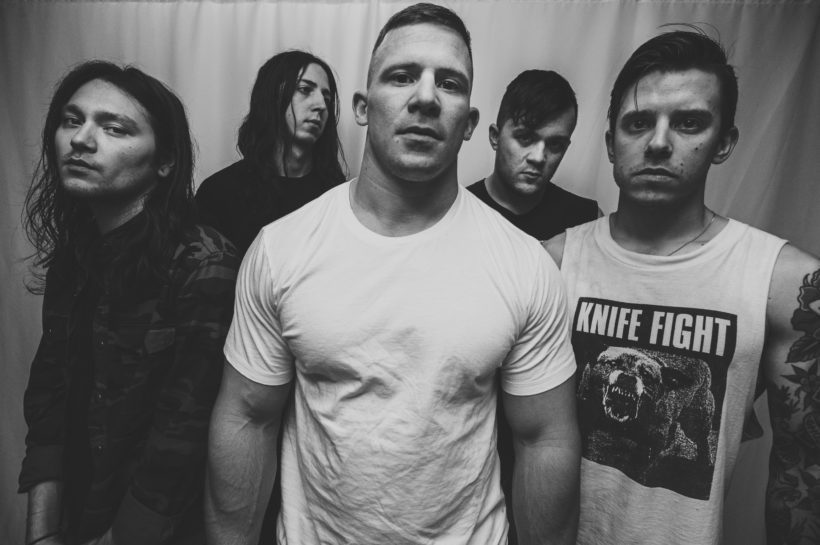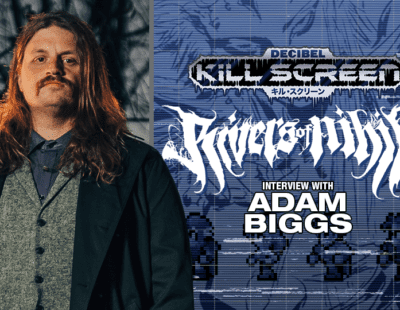
From the first bulldozing notes of “Human Carrying Capacity,” the opener to Harm’s Way’s fourth full-length album, Posthuman, it’s clear that the Chicago quintet have transcended the realm of hardcore and become something unique to extreme music. With Posthuman, Harm’s Way expand on the industrial and nu metal influences that have long been present in their music while still delivering an absolutely pummeling metallic hardcore beatdown.
“We had been writing this record for almost two years before we had all the songs pretty much ready to go and ready for recording,” vocalist James Pligge tells Decibel.
Signing to Metal Blade gave the band a larger budget to record Posthuman than previous releases, which Pligge says made the decision a long process. They eventually settled on New Jersey-based producer Will Putney, whose recent credits include work with Knocked Loose, Every Time I Die and Body Count.
“We felt like he was a person who knew our material the best and would be able to kind of personalize what we were looking for for our sound,” Pligge explains, “even though regardless of some of the releases he had put out weren’t necessarily in line with what we were looking for.” (Putney is also known for his work with metalcore/deathcore giants like For Today, Suicide Silence and Upon a Burning Body).
The recording process for the album took 18 days, the longest consecutive amount of time Harm’s Way had ever been afforded in the studio. Once it was mixed and mastered, Posthuman was adorned with art from David Altmedj.
As Harm’s Way progress and explore their sound, fans of the band’s earlier work may become alienated but Pligge and company take that in stride.
“For the last seven years of our band, we’ve been highly influenced by metal and we all love heavy metal music,” he says. “It kind of shaped what Harm’s Way became. It’s not something we think about.”
In fact, he acknowledges the more metallic direction as beneficial because he believes Posthuman will appeal more to metalheads while still maintaining a metallic hardcore sound.
Harm’s Way’s flirtation with elements of nu metal won’t come as a surprise to fans of their breakthrough album Rust, and songs like “Temptation” will inevitably draw comparisons to early Slipknot, yet Harm’s Way don’t consider themselves nu metal fans.
“In my opinion, Slipknot’s catalogue of 150 songs as a whole is not very good, but there’s probably ten songs that I think are really strong,” Pligge admits. “A couple of those parts may have been influenced by one or two of those songs. It’s hard to say; nu metal, to me, is used in a negative way.”
He does, however, add that Harm’s Way has been influenced by bands like Tryptikon and Machine Head, a comparison he believes is better and more accurate.
The Chicago bruisers also go full industrial on “The Gift,” a song driven by a Godflesh-style instrumental that serves as a departure from the destructive hardcore found on the rest of Posthuman.
“Maybe people who haven’t ever heard our band before might be thrown off by it, but it’s kind of a direction we’ve been hinting towards for a long time,” Pligge elaborates. “Every single one of our albums since 2011 have a lot of Godflesh influence. We’re big fans of Godflesh, Nine Inch Nails, Ministry and we really wanted to incorporate more of those aspects on this new record and try to do it in a way that is the most aggressive as possible.”
Pligge says that Harm’s Way have considered releasing strictly-industrial EPs, but they won’t be making a complete departure from metallic hardcore.
While the release of Posthuman will undoubtedly and deservedly raise Harm’s Way’s profile in both the metal and hardcore communities, Pligge says the band are not content to rest on their laurels and will continue to make fresh, different sounding records with each release of their career. Here’s hoping it will be a long one.
Posthuman is out today via Metal Blade.





